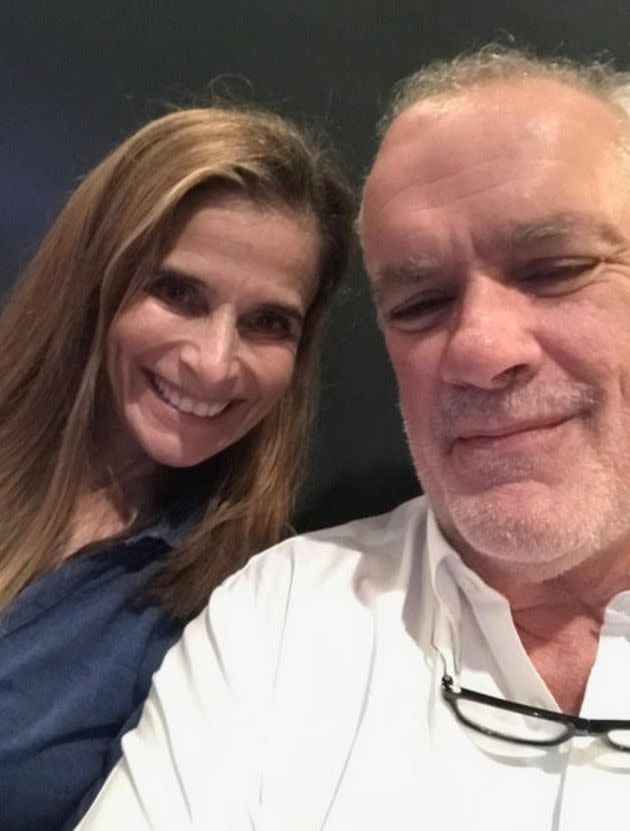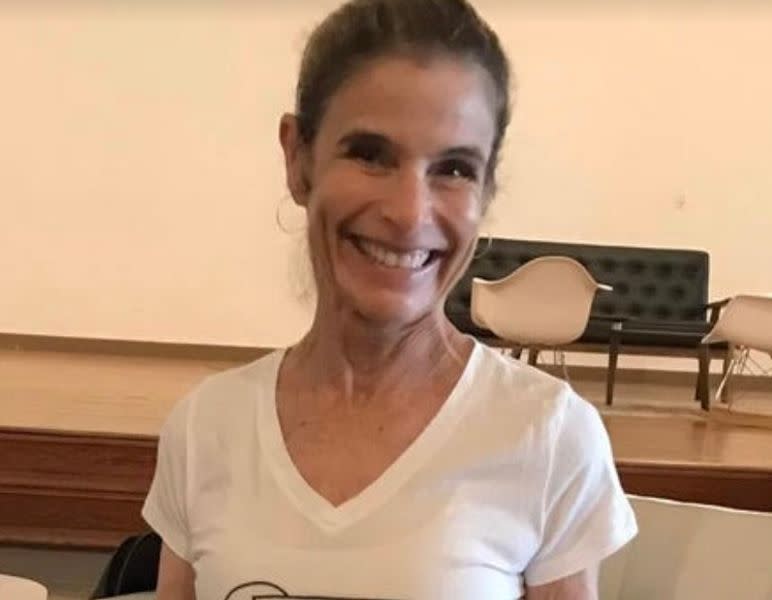The author at a Writing Class Radio course in 2019. (Photo: Photo by Allison Langer)
Check out more stories from Busted, our series offering an unfiltered exploration and celebration of our breasts and ourselves during Breast Cancer Awareness Month.
I had a double mastectomy in 1997 at the age of 40. I was married and had two children under the age of 11.
Cutting off my breasts when I didn’t have cancer seemed radical, but it wasn’t radical for me. I have the BRCA1 gene mutation. That means I have a 60% chance of getting ovarian cancer and an 85% chance of getting breast cancer — the deadly kind that doesn’t respond to treatment. To me, those odds felt like 100%.
Before there was genetic testing, my mother was diagnosed with ovarian cancer at the age of 62 and died a few years later. Then two of my cousins got breast cancer before they were 60 and both died. So I got a prophylactic hysterectomy and a double mastectomy.
Now I’m 64 and I know I made the right decision because I’m alive.
Before the surgery, I spoke to a few other women who had mastectomies. They told me how painful it was to raise their arms after the procedure and how it took months to stretch their skin to accommodate the implants used to create reconstructed breasts. None of this scared me. I knew that being diagnosed with cancer and chemotherapy and dying was, of course, much worse.
So I had surgery and three days later took my son to his first day of kindergarten with surgical drains hidden under an oversized shirt.
I didn’t ask the plastic surgeon what my breasts would look like after the reconstruction. I even thought they would look better and fuller like they did before I breastfed two babies. I was wrong.
My implants are not like the ones that make many women look and feel sexier. Mine, which you get when the surgeon scrapes out every bit of breast tissue, is just under the skin. The skin covering the implants is thin and tight and cold to the touch – a different temperature than the rest of my body.
It turns out that breast reconstruction after a radical mastectomy is a difficult process. After the first surgery, I had six more surgeries over the next 15 years to deal with the pain caused by the scar tissue and also to try to make my breasts look more normal. Three times the cosmetic surgeons attached artificial nipples made from skin taken from my pubic area and they always fell off within a month of the surgery.
My boobs were ugly and I hated letting anyone see them. Even the doctors couldn’t hide their disgust. When I went to the dermatologist for skin cancer screening once a year, I reminded him of my mastectomy and reconstruction to avoid the slightest change in his facial expression, like the last time I saw him open my paper coat.
After the surgery, I would lock the door when I showered or turn away from my husband when I was changing in front of him. I never asked him if he wanted to see or feel my breasts, and he never asked. I kept my t-shirt on during sex for the remaining 12 years of our marriage and we never discussed it.
After my divorce and more reconstructive surgeries, my breasts, now with tattooed nipples where the fleshy ones should have been, looked better, but they still weren’t “normal”. They were too hard and too cold. When I first started dating, it had been 30 years since I’d dated any man other than my husband. I was afraid of intimacy, of letting a man see or touch my 50+ year old body. But my boobs made me think about never going out again.
When I told the first man I dated how awkward I felt taking my shirt off, he said, “You never have to take your shirt off for me. We’re going to play jerseys and skins, like in a pickup basketball game.”
Most of the time we did that for five years.
When I first started dating David three years ago, I went to his house for dinner. We stood in his kitchen chatting and sipping our drinks, a Vodka Cranberry for me and a Scotch for him. He looked at me and said, “I really want to kiss you,” and leaned in for the kiss. I kissed him back. It feels good. As the kissing grew more passionate, we moved to the couch. A few minutes later I pulled away and put my hand on his chest.

The author and David at a play in Coral Gables in 2020 (pre-pandemic). (Photo: Photo by Barbara Poliacoff)
My fear grew. I had to give him my rehearsed speech. I had considered giving it earlier, like on our first date, but that seemed too early, or an afterthought, in a text message before our second date. Now I felt I had no choice but to tell him mid-kiss before he grabbed my breasts.
“I had a double mastectomy and reconstructive surgery because I have a genetic mutation that causes breast cancer and ovarian cancer,” I told him.
I assured him that I don’t have cancer. I mentioned that Angelina Jolie didn’t have cancer either, but went through the same thing. I had the surgery years before Jolie, but most people know her experience.
I was afraid my speech about dying and ugly boobs would be buzzkill, but I had to warn him lest he be surprised by what he saw or touched. I felt the familiar panic I always had when giving my speech. I worried that the man I was beginning to like would be disappointed or repelled. My armpits were sweaty and I was hoping my deodorant was working.
“Don’t worry, I’ve seen women with implants before,” he said.
“Not my kind of implants,” I replied.
In the direct, no-nonsense way I’ve become accustomed to, he said, “Let’s get this over with,” and gently pulled my shirt over my head. I helped him unhook my bra. He quickly looked at my breasts, said they were beautiful, and although I didn’t believe him, we continued kissing.
Since then I have spoken to David many times about my insecurities about my breasts.
I’m not the same person who hid under a t-shirt for so long and never told her ex-husband how scared she was that after a double mastectomy he wouldn’t want or love her.
I wasted years after surgery hating and hiding my boobs, but I don’t blame myself. I grew up in a looks-obsessed culture that made me think I had to look like Angelina Jolie. I’m glad Jolie told the world that she has the mutation of the BRCA gene and underwent prophylactic surgery because it might have saved some lives. Maybe her reconstruction looks better than mine, and maybe she wasn’t afraid to take her shirt off afterwards. I was because our culture makes women feel like they need to look perfect.
Now I see my breasts as just another imperfection, like the wrinkles on my knees or the age spots on my forearms, and they don’t make me any more or less lovable.
My reconstructed breasts no longer feel like a secret to hide. David normalized my chest for me because he touches me frequently and without hesitation. When he touches my boobs and tells me he loves them, I started to believe him. Not because I find my breasts beautiful or even okay, but because they are a part of me.
I showed David the real me by removing my shirt, but I learned that speaking out about my insecurities was really important. Now, when David and I are spooning and he puts his arm across my back and puts his hand on one of my breasts, I relax into his touch and fall asleep.
Margery Berger is a mother of two adult children and lives in Miami with her two badly behaved dogs and David. She has written for Home Miami Magazine, Lip Service, Next Tribe, and the Writing Class Radio podcast.
Have a compelling personal story you’d like to see published on HuffPost? Find out what we’re looking for here and send us a pitch.
This article originally appeared on HuffPost and has been updated.
Related…
#hated #boobs #afraid #show #dates #Heres #happened


Leave a Comment